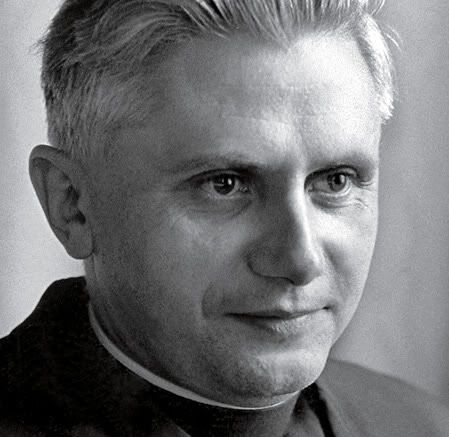 „Zo súčasnej krízy sa vynorí Cirkev, ako tá, ktorá stratila
veľa. Stane sa malou a bude musieť začať viac menej od začiatku. Nebude schopná
obývať budovy, ktoré postavila v časoch prosperity. S úbytkom svojich veriacich
stratí aj veľkú časť spoločenských privilégií. ... Znovu začne od malých skupín, od
hnutí, a z menšiny, ktorá znovu položí vieru do stredu skúsenosti. ... Bude to
viac duchovná Cirkev, ktorá si nebude nárokovať politický mandát, nebude flirtovať
raz s ľavicou raz s pravicou. Bude chudobná a stane sa Cirkvou biednych. ... Vtedy
ľudia uvidia to maličké stádo veriacich, ako niečo úplne nové: objavia ho ako
nádej pre seba samých, ako odpoveď, ktorú stále potajme hľadali."
„Zo súčasnej krízy sa vynorí Cirkev, ako tá, ktorá stratila
veľa. Stane sa malou a bude musieť začať viac menej od začiatku. Nebude schopná
obývať budovy, ktoré postavila v časoch prosperity. S úbytkom svojich veriacich
stratí aj veľkú časť spoločenských privilégií. ... Znovu začne od malých skupín, od
hnutí, a z menšiny, ktorá znovu položí vieru do stredu skúsenosti. ... Bude to
viac duchovná Cirkev, ktorá si nebude nárokovať politický mandát, nebude flirtovať
raz s ľavicou raz s pravicou. Bude chudobná a stane sa Cirkvou biednych. ... Vtedy
ľudia uvidia to maličké stádo veriacich, ako niečo úplne nové: objavia ho ako
nádej pre seba samých, ako odpoveď, ktorú stále potajme hľadali."
Text v taliančine (z Facebooku):
"Dalla crisi odierna emergerà una Chiesa che avrà perso
molto. Diverrà piccola e dovrà ripartire più o meno dagli inizi. Non sarà più
in grado di abitare gli edifici che ha costruito in tempi di prosperità. Con il
diminuire dei suoi fedeli, perderà anche gran parte dei privilegi sociali. ... Ripartirà da piccoli gruppi, da movimenti e da una minoranza che rimetterà la
Fede al centro dell’esperienza. ... Sarà una Chiesa più spirituale, che non si
arrogherà un mandato politico flirtando ora con la Sinistra e ora con la
Destra. Sarà povera e diventerà la Chiesa degli indigenti. Allora la gente
vedrà quel piccolo gregge di credenti come qualcosa di totalmente nuovo: lo
scopriranno come una speranza per se stessi, la risposta che avevano sempre
cercato in segreto."
Kompletnejšia verzia v angličtine (zdroj):
“From the crisis of today the Church of tomorrow will emerge – a Church that has lost much. It will become small and will have to start afresh more or less from the beginning. It will no longer be able to inhabit many of the edifices it built in its palmy days. As the number of its adherents diminishes so will it lose many of its social privileges. In contrast to any earlier age, it will be seen much more as a voluntary society, entered only by free decision. As a small society it will make much bigger demands on the initiative of its individual members. Undoubtedly it will discover new forms of ministry, and will ordain to the priesthood approved Christians who pursue some profession. In many smaller congregations or in self-contained social groups pastoral care will normally be provided in this fashion. Alongside this the full-time ministry of the priesthood will be indispensable as formerly. But in all of the changes at which one might guess the Church will find its essence afresh and with full conviction in that which was always at its center: faith in the triune God, in Jesus Christ, the Son of God made man, in the presence of the Spirit until the end of the world. In faith and prayer it will again recognized its true center, and experience the sacraments again as the worship of God and not as a subject for liturgical scholarship.
“The Church will be a more spiritualized Church, not presuming upon a political mandate, flirting as little with the Left as with the Right. It will be hard going for the Church, for the process of crystallization and clarification will cost it much valuable energy. It will make it poor and cause it to become the Church of the meek. The process will be all the more arduous, for sectarian narrow-mindedness as well as pompous self-will will have to be shed. One may predict that all of this will take time. The process will be long and wearisome as was the road from the false progressivism of the eve of the French Revolution – when a bishop might be thought smart if he mad fun of dogmas, and even insinuated that the existence of God was by no means certain – to the renewal of the nineteenth century. But when the trial of this sifting is past, a great power will flow from a more spiritualized and simplified Church. Men in a totally planned world will find themselves unspeakable lonely. If they have completely lost sight of God, they will feel the whole horror of their poverty. Then they will discover the little flock of believers as something wholly new. They will discover it as a hope that is meant for them, and answer for which they have always been searching in secret.
“And so it seems to me that the Church is facing very hard times. The real crisis has scarcely begun. We will have to count on terrific upheavals. But I am equally certain about what will remain at the end: not the Church of the political cult, which is dead already – with Gobel – but the Church of faith. It may well no longer be the dominant social power to the extent that it was until recently; but it will enjoy a fresh blossoming, and be seen as man’s home where he will find life and hope beyond death.”
zdroj citoval: J. Ratzinger, “Faith and the Future“, Franciscan Herald Press, (1971) 103-106.


Žiadne komentáre:
Zverejnenie komentára